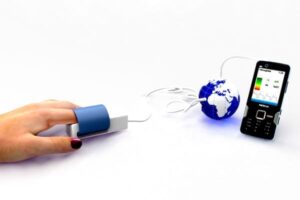The HemoGlobe student inventors have estimated that their cellphone–based systems could be produced for $10 to $20 each.
Could a low-cost screening device connected to a cellphone save thousands of women and children from anemia-related deaths and disabilities?
That’s the goal of Johns Hopkins biomedical engineering undergraduates who say they’ve developed a noninvasive way to identify women with this dangerous blood disorder in developing nations. The device is designed to convert the existing cellphone lines of health workers into a “prick-free” system for detecting and reporting anemia at the community level.
The students’ project, HemoGlobe, recently received a boost when it was awarded a $250,000 seed grant in the Saving Lives at Birth: A Grand Challenge for Development competition. The event, which attracted more than 500 entrants from 60 countries, was sponsored by prominent global health organizations, including the U.S. Agency for International Development and the Bill & Melinda Gates Foundation. Only 12 entrants were awarded seed grants.
“When we thought about the big-name corporations and nonprofit groups we were competing against, we were amazed and surprised to find out that our team had won,” said team member George Chen, a sophomore majoring in biomedical engineering.
Chen attended the July 14 announcement ceremony in Seattle, along with Soumyadipta Acharya, the project’s faculty adviser and principal investigator, and team members Noah Greenbaum and Justin Rubin.
Acharya, an assistant research professor in the Department of Biomedical Engineering, said that the Saving Lives win showed that his students had taken an important step toward reducing anemia-related deaths in developing countries. “This device has the potential to be a game changer,” Acharya said. “It will equip millions of health care workers across the globe to quickly and safely detect this debilitating condition in pregnant women and newborns.”
The undergraduates he supervised spent a year brainstorming and building a prototype for a biomedical engineering design team class. The $250,000 will allow the students to refine their technology, as well as support field testing next year in Kenya by Jhpiego, a Johns Hopkins affiliate that provides global health training and services for women and their families. Jhpiego sponsored the HemoGlobe project through a partnership with the university’s Center for Bioengineering Innovation and Design.
via The JHU Gazette
The Latest Streaming News: Anemia updated minute-by-minute
Bookmark this page and come back often
Latest NEWS
Latest VIDEO








